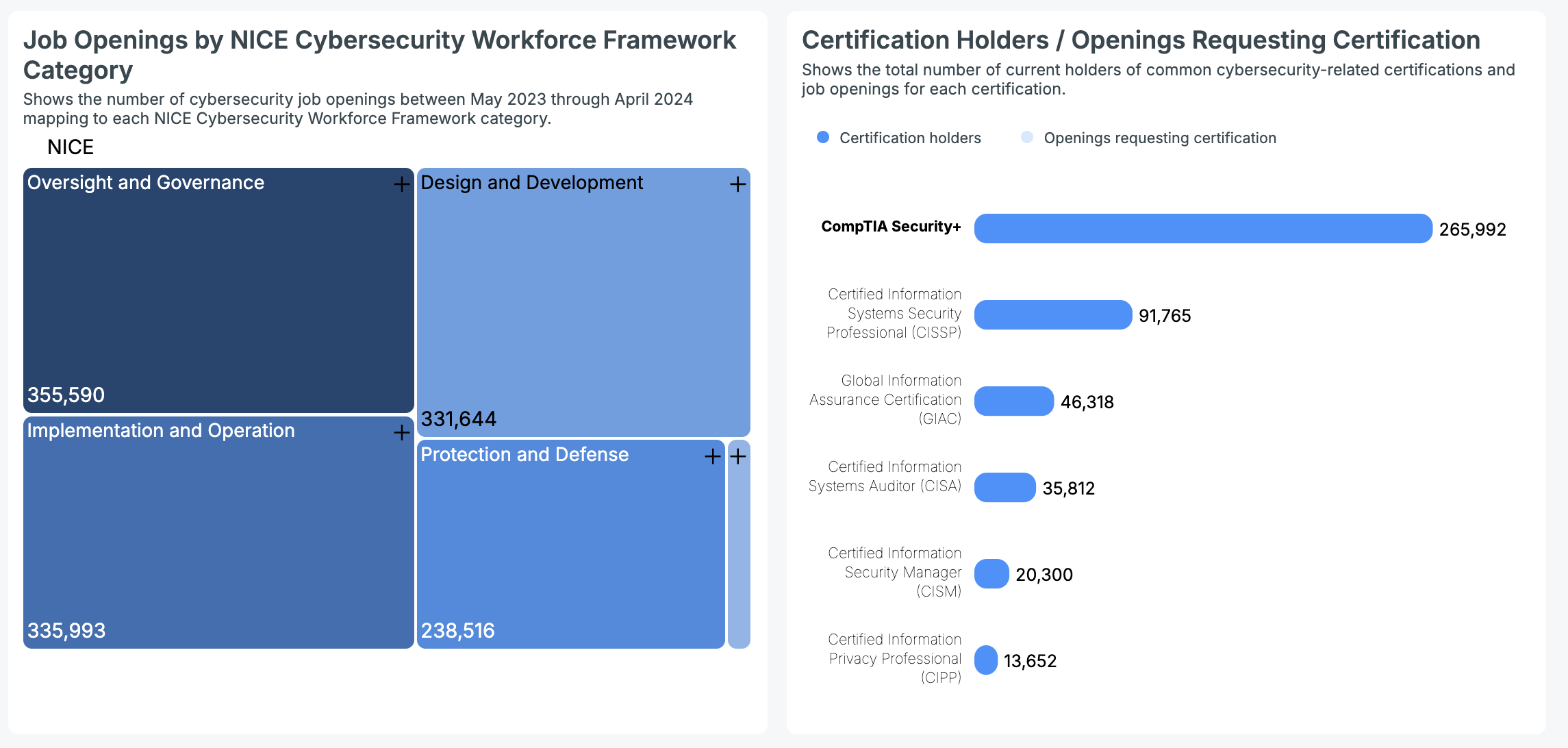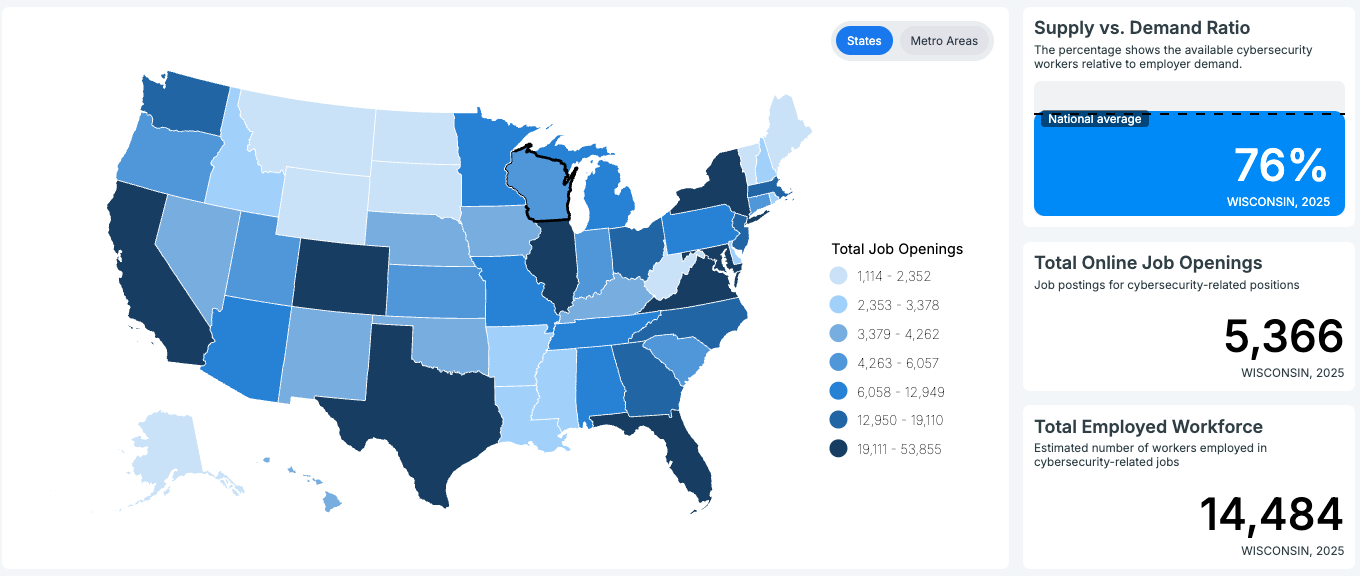- Associate degrees
- Bachelor’s degrees
- Master’s degrees
- Cybersecurity certifications
- Organizations in Wisconsin
- Cybersecurity jobs
Wisconsin is an agricultural economy: after California, they are the second-largest dairy producer in the United States. That being said, Wisconsin is also home to Epic, a multi-national company with a huge stake in cybersecurity.
Ad
cybersecurityguide.org is an advertising-supported site. Clicking in this box will show you programs related to your search from schools that compensate us. This compensation does not influence our school rankings, resource guides, or other information published on this site.
Featured Cybersecurity Degree Programs
| School Name | Program | More Info |
|---|---|---|
| Purdue Global | Online BS in Cybersecurity | website |
| Southern New Hampshire University | Online BS in Cybersecurity or Online MS in Cybersecurity | website |
| UC Berkeley School of Information | Master’s in Cybersecurity | No GRE/GMAT Required | website |
| Arizona State University | Online MA in Global Security - Cybersecurity | website |
| Grand Canyon University | Online BS in Cybersecurity or Online MS in Cybersecurity | website |
With more than 10,000 employees and headquartered in Verona, Wisconsin, Epic is America’s leading provider of EHR (Electronic Health Record) software.
Judy Faulkner, Epic’s CEO, announced that as of 2015, Epic holds more than 50 percent of all medical records in the United States.
That’s great for their bottom line; however, it also places a huge responsibility on Epic to keep those records safe. Cybercrime has been growing year over year and the healthcare industry has not been immune to this trend.
For example, in the first six months of 2019, more than 30 million patient records were stolen. That theft equates to roughly one in ten Americans, a staggering number.
Protenus, an analytics firm, has completed research that suggests that there is a data breach every day of the year, on average.
Where do the stolen records end up?
The dark web, where records are bought and used to assemble fake identities, can be used for a wide range of social engineering attacks.
Given the illicit use of medical records, it’s not surprising that firms like Epic have a legal responsibility to protect the medical records of their clients.
The Health Insurance Portability and Accountability Act,
“establishes national standards to protect individuals’ medical records and other personal health information. It applies to all healthcare and health plan providers, healthcare clearinghouses, and certain electronic healthcare transactions.”
Epic is subject to these rules and must make every effort to guard their data from cybercrime. Within the company, that responsibility falls squarely on the shoulders of the cybersecurity team.
Wisconsin might not be Silicon Valley, but when it comes to cybersecurity, Epic is well aware of how important it is to stay safe. That awareness runs through the state, as well.
Cybersecurity organizations in Wisconsin
Wisconsin’s CypherCon is headed into its fifth year. The conference is a gathering place for software enthusiasts and cybersecurity technicians from across the country.
Keynote topics include cybercrime prevention as well as ethical hacking to expose security flaws in system design.
Besides presentations, CypherCon also offers hands-on projects and activities designed to teach practical cybersecurity skills.
In addition, Wisconsin is becoming increasingly aware of the crucial role cybersecurity plays in securing elections.
The Wisconsin Election Security Council is a recently formed group that seeks to,
“find ways to use existing resources to enhance cyber security, strengthen relationships and work with partners on security training programs for state and local officials.”
Given the allegations of Russian interference in the 2016 presidential election, it makes sense that Wisconsin is taking the threat of electoral cybercrime seriously.
Finally, Wisconsin encourages those interested to apply for the SFS (Scholarship for Service),
“a unique program designed to recruit and train the next generation of information technology professionals, industrial control system security professionals, and security managers.”
The scholarship will pay for up to three years of schooling, undergraduate or graduate, with the agreement that the graduate will work as a cybersecurity technician for either the local or federal government.
That’s a good deal, as Wisconsin has many cybersecurity education programs to select from.
Cybersecurity educational opportunities in Wisconsin
The associate’s degree is the quickest and least expensive way to get started in the cybersecurity field. It provides the candidate with a good background in cybersecurity and prepares them to handle and resolve basic threats.
A helpful advantage of the associate’s degree is that, in some cases, credits earned can be applied towards further education, such as a bachelor’s degree.
Cybersecurity associate degrees in Wisconsin
Wisconsin offers two different associate’s degrees. For more information on these degrees, please see the list below.
- Program: Associate of Applied Science – Cybersecurity Specialist
Credits: 61
Cost per credit: $189 in state | $283 out of state
Delivery Method: Campus
Learn more: Program details - Program: Associate Degree in Cybersecurity
Credits: 63
Cost per credit: $163 in state | $236 out of state
Delivery Method: Campus, Online
Learn more: Program details
Cybersecurity bachelor’s degrees in Wisconsin
A bachelor’s degree is the industry standard and will typically be required as a bare minimum for most cybersecurity positions.
Those pursuing a bachelor’s degree will be exposed to a wide range of subjects from computer science to algebra, depending on the university’s program.
Online bachelor’s degrees
There is one online bachelor’s program available to students in Wisconsin.
An online degree can be cheaper than attending a campus-based program and offers more freedom in scheduling.
- Program: Online Cybersecurity Degree – Bachelor’s program
Credits: 120
Cost per credit: $473
Delivery Method: Online
Learn more: Program details
Cybersecurity master’s degrees in Wisconsin
A master’s degree can open doors for the aspiring cybersecurity technician. Those with a master’s typically earn a higher salary and may be eligible for better positions within the company.
At the moment, there are two online master’s degree programs in Wisconsin.
- Program: Master of Science in Cybersecurity
Credits: 34
Cost per credit: $850
Delivery Method: Online
GRE/GMAT Required: Not Required
Learn more: Program details - Program: Online Master of Science in Cybersecurity
CAE designation: CAE-CD
Credits: 30
Cost per credit: $678
Delivery Method: Online
GRE/GMAT Required: Required
Learn more: Program details
Cybersecurity certifications in Wisconsin
Based on Cyberseek’s comprehensive nationwide data, the current number of professionals holding common cybersecurity certifications is as follows:
- CompTIA Security+: 265,992 certified professionals
- CISSP: 91,765 certified professionals
- GIAC: 46,318 certified professionals
- CISA: 35,812 certified professionals
- CISM: 20,300 certified professionals
- CIPP: 13,652 certified professionals

Certifications are not only a good way to fill out a resume, but they’re also useful for learning about niche skill sets within the cybersecurity industry.
Broadly speaking, the more certifications an applicant has, the more companies will be interested in hiring them.
Campus-based certification programs
There is only one certification option available in Wisconsin. Please consult the list for more information.
- Program: Cyber Security Certificate
Credits: 9
Cost per credit: $1,022 in-state | $2,088 out of state
Delivery Method: Campus
Learn more: Program details
Online certification programs
Wisconsin also has an online certification program.
- Program: Graduate certificate in Cybersecurity
CAE designation: CAE-CD
Credits: 12
Cost per credit: $678
Delivery Method: Online
Learn more: Program details
Cybersecurity bootcamps in Wisconsin
Cybersecurity bootcamps in Wisconsin offer intensive training programs designed to equip participants with the skills and knowledge needed to defend against cyber threats and pursue careers in the rapidly evolving field of cybersecurity.
- Program: Cybersecurity Bootcamp
Length: 4-32 Weeks
Cost: $180 / $17,800
Delivery Method: Online
Learn more: Program details
Cybersecurity jobs in Wisconsin
The cybersecurity sector experienced significant nationwide demand from May 2023 to April 2024. Oversight and Governance led with 355,590 job openings.
Implementation and Operation (335,993) and Design and Development (331,644) followed closely. Protection and Defense roles were 238,516, and Investigation had 19,525.
It’s good news for anyone considering a cybersecurity career in Wisconsin: there are more jobs than applicants to fill them.
According to CyberSeek’s data, 14,484 people are currently employed in the cybersecurity field, and there are 5,366 job opportunities.

Wisconsin’s thousands of unfilled cybersecurity jobs reflect a broader trend across the United States: an alarming lack of cybersecurity technicians.
Cybercrime is rising steadily every year and research has revealed that a data breach costs an American company $8 million on average.
A cybersecurity technician’s salary is just a fraction of that cost and companies from Milwaukee to Miami are willing to spend money to protect their systems. For the cybersecurity job applicant, there has never been a better time to be in the industry.
According to Bureau of Labor Statistics, security analysts in Wisconsin were earning an average hourly wage of $47.70, and the average annual salary was $99,210.
Cybersecurity in Wisconsin
Although Wisconsin is primarily an agricultural state in Epic has a thriving company that is mandated by law to protect client data.
The cybersecurity opportunities extend beyond just one company, however.
With the CypherCon conference and general appreciation of the role that cybersecurity plays in protecting their various industries, Wisconsin has shown itself to be a forward-thinking state.
From an associate’s to a master’s, it’s possible to receive an entire cybersecurity education in the state.
After graduation, there are thousands of job openings to choose from, and given the rising number of data breaches, it looks like the job market is only set to expand.